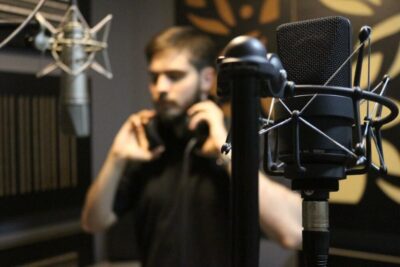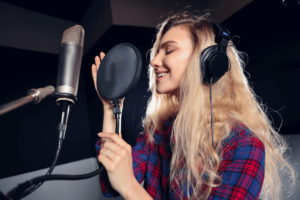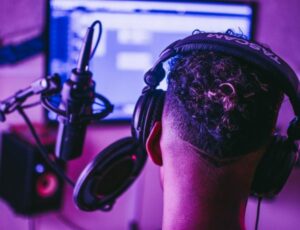“Have you ever wondered why do musicians wear headphones? Whether they’re in the studio recording a new track or on stage performing in front of thousands of fans, headphones are a staple accessory for any musician. But why is that? In this article, we’ll explore the many reasons why musicians wear headphones.
Musicians wear headphones to monitor their performance, isolate themselves from outside noise, and communicate with other band members and audio engineers during live performances or recording sessions.
Why do musicians wear headphones?
As a musician, having the right tools at your disposal can make all the difference when it comes to creating and performing music. One of the essential pieces of equipment for many musicians is a pair of headphones. But why do musicians wear headphones?
One of the main reasons musicians wear headphones is for monitoring. When recording in a studio, musicians need to be able to hear their performance in real-time in order to make adjustments and ensure that it is being captured correctly.
Also, headphones allow musicians to hear their own performance and the mix of the other instruments and vocals, providing them with a more accurate representation of the final product.
Another reason musicians wear headphones is for isolation. When performing live, there are often many distractions and background noise that can make it difficult to hear and stay in sync with the other band members. Headphones help to block out these distractions, allowing musicians to focus on their performance.
Additionally, headphones also play an important role in communication during live performances and recording sessions. Musicians often use headphones to communicate with other band members and audio engineers, ensuring that they are in sync and that the sound is balanced correctly.
Furthermore, headphones can be used as a tool for practicing and rehearsing, allowing musicians to hear the music they are playing or singing along with without disturbing others around them.
Benefits of wearing headphones for musicians
Wearing headphones as a musician can offer a number of benefits, including:
- Improved monitoring: Headphones allow musicians to hear their own performance and the mix of the other instruments and vocals in real time, providing them with a more accurate representation of the final product. This can help to improve the overall quality of the recording or performance.
- Increased focus: Headphones can help to block out distractions and background noise, allowing musicians to focus on their performance and stay in sync with the other band members.
- Enhanced communication: Musicians often use headphones to communicate with other band members and audio engineers during live performances and recording sessions, ensuring that they are in sync and that the sound is balanced correctly.
- Better practice and rehearsals: Headphones can be used as a tool for practicing and rehearsing, allowing musicians to hear the music they are playing or singing along with without disturbing others around them.
- Personalized listening experience: Some musicians prefer to use headphones during recording or live performances, as it allows them to have a personalized listening experience and to better control the sound and volume they want to hear.
- Protection for the ears: Wearing headphones can also protect the musician’s ears from the loud volume of the instruments, especially during live performances where the decibel level can be high.
Overall, wearing headphones can greatly enhance the creative process and improve the overall performance experience for musicians. It allows them to focus on their craft, communicate effectively and protect their ears from loud noise.
How headphones help musicians hear themselves and other instruments clearly
Headphones help musicians hear themselves and other instruments clearly by providing a more accurate representation of the sound.
When recording in a studio, musicians need to be able to hear their performance in real-time in order to make adjustments and ensure that it is being captured correctly. Headphones allow musicians to hear their own performance and the mix of other instruments and vocals.
This allows them to make adjustments to their playing or singing, such as adjusting their volume or phrasing, to ensure that they are in sync with the other instruments and that their performance is being captured correctly.
During live performances, the sound can be affected by the acoustics of the venue and the presence of other instruments and vocals on stage. Headphones can help to isolate the musician from these distractions, allowing them to focus on their performance and to hear their own instrument or vocals more clearly.
In addition, musicians often use headphones to communicate with other band members and audio engineers during live performances and recording sessions. This allows them to hear the mix of the other instruments and vocals more clearly, and to make adjustments to their own performance accordingly.
Overall, headphones provide a more accurate representation of the sound, allowing musicians to hear themselves and other instruments more clearly. This can greatly enhance the creative process and improve the overall performance experience.
The role of headphones in recording and mixing music
Headphones play an important role in the recording and mixing of music. They are typically used by engineers, producers, and musicians during the recording process to monitor the audio being recorded and to help ensure that it is of high quality.
In the mixing stage, headphones are used to listen to the various elements of a mix and make adjustments to the balance and EQ of the individual tracks.
Some key uses of headphones in recording and mixing music include:
- Monitoring during recording: Headphones allow musician to hear their own performance in real-time, which can help them to play more accurately and with better timing.
- Isolation: Headphones can be used to isolate the sound of a specific instrument or vocal track, making it easier to record or mix that track.
- Reference listening: Engineers and producers often use headphones to listen to reference tracks and make comparisons to the music they are working on.
- Mixing: Headphones are a valuable tool for mix engineers, allowing them to listen to the individual elements of a mix in isolation and make adjustments to the balance and EQ of the tracks.
- Editing: Headphones are also used for editing audio, as they allow the editor to hear the audio clearly and make precise cuts and adjustments.
- Quality Control: Headphones can be used for quality control, as they allow the engineer to listen to the audio at different levels and identify any issues with the audio quality.
The importance of wearing headphones with a good fit and sound quality for musicians
Wearing headphones with a good fit and sound quality is important for musicians for several reasons.
- Comfort: Musicians often wear headphones for long periods of time, so it is important that they fit well and are comfortable to wear. This will help prevent discomfort and fatigue, which can affect a musician’s performance.
- Sound isolation: A good fit can also help to provide better sound isolation, which is important in recording and live performance situations. This can help to prevent bleed-through of other instruments or sound sources into a musician’s headphones, which can affect their ability to hear their own performance clearly.
- Accurate monitoring: A good fit can also help to ensure that the audio being heard by the musician is accurate and true to the source. This is particularly important for musicians who are playing along with recorded tracks or other musicians.
- Sound quality: Headphones with good sound quality can help musicians to hear their own performance more clearly, which can improve their ability to play accurately and with good timing. High-quality headphones can also help to reveal details in the mix that may be missed with lower-quality headphones.
- Creativity: Good sound quality in headphones can also help to inspire creativity and provide a better overall listening experience for the musician. This can help them to come up with new ideas and make better musical decisions.
In summary, a good fit and sound quality in headphones are essential for musicians as they help to ensure comfort, accurate monitoring, and sound isolation, as well as inspire creativity and provide an overall better listening experience.
The benefits of using noise-canceling headphones for musicians
Noise-canceling headphones can be beneficial for musicians in several ways. Firstly, they can help to reduce external noise, allowing musicians to focus on their music and improve their concentration. This can be especially useful for musicians who are recording in a noisy environment.
Secondly, noise-canceling headphones can also be used to help musicians better hear their own playing, particularly when rehearsing or practicing. This can be especially helpful for musicians who are working on intricate parts of a song or trying to perfect a specific technique.
Lastly, noise-canceling headphones can also be used to block out external noise during live performances, allowing musicians to better hear themselves and the other performers on stage. This can help to improve the overall sound quality of the performance and make it easier for musicians to stay in sync with the rest of the band.
The different types of headphones available for musicians and their specific uses
There are several types of headphones available for musicians, each with its own specific uses. Some of the most common types include:
- Studio Headphones: These headphones are designed for recording and mixing music in a studio setting. They are typically closed-back and provide a flat frequency response, allowing engineers to hear the true sound of their recordings.
- In-ear monitors (IEMs): These headphones are worn inside the ear canal and are commonly used by live performers to hear their own mix on stage. They provide a high level of isolation and are available in both universal and custom-molded versions.
- DJ headphones: These headphones are designed for use in a DJ booth and often feature a swiveling ear cup for one-ear monitoring. They are typically built to withstand the rigors of regular use in a club or party setting.
- Noise-canceling headphones: These headphones use active noise-cancellation technology to block out external noise, making them ideal for use in loud environments such as airplanes or trains.
- Wireless headphones: These headphones connect to a device via Bluetooth or Wi-Fi, allowing for greater freedom of movement. They are useful for musicians who need to move around while performing or recording.
It’s also important to note that different musicians may prefer different types of headphones, depending on their specific needs and preferences.
The impact of headphones on a musician’s hearing health
Headphones can have a significant impact on a musician’s hearing health, especially if they are used for prolonged periods of time at high volumes.
Prolonged exposure to loud noise can cause damage to the hair cells in the inner ear, which are responsible for sending sound signals to the brain. This damage can lead to hearing loss, tinnitus (ringing in the ears), and other auditory problems.
Musicians who use headphones for long periods of time may also be at risk of developing hyperacusis, a condition characterized by an increased sensitivity to certain frequencies and loud sounds.
To protect their hearing, musicians should take several precautions when using headphones:
- Keep the volume at a moderate level. The World Health Organization recommends that adults should not be exposed to sound levels above 85 decibels (dB) for extended periods of time.
- Take regular breaks. It’s important to give your ears a break every hour or so, even if the volume is at a safe level.
- Use noise-canceling headphones to reduce the need to increase the volume to hear over background noise.
- Consider using in-ear monitors (IEMs) instead of over-ear headphones, as they allow for a lower volume level to be effective and provide better isolation from external noise.
- Get your hearing checked regularly. This will allow you to detect any hearing loss early before it becomes a serious problem.
Tips for choosing the right headphones for different musical purposes
When choosing headphones for different musical purposes, it’s important to consider factors such as sound quality, comfort, and durability. Here are some tips to help you choose the right headphones for your needs:
- Studio Headphones: Look for headphones with a flat frequency response and a closed-back design to minimize external noise. A good pair of studio headphones should also have a comfortable fit and be able to handle high volume levels without distortion.
- In-ear monitors (IEMs): Look for IEMs that have a good fit and provide a high level of isolation. Some musicians prefer universal-fit IEMs, while others prefer custom-molded versions.
- DJ headphones: Look for headphones that have a swiveling ear cup for one-ear monitoring and a durable design that can withstand the rigors of regular use in a club or party setting.
- Noise-canceling headphones: Look for headphones that have active noise-cancellation technology and a comfortable fit. It’s also important to consider the battery life and whether they can be used wired or wireless.
- Wireless headphones: Look for headphones that have good battery life and a stable wireless connection. It’s also important to consider whether they have a built-in microphone for taking calls.
Ultimately, the best headphones for you will depend on your specific needs and preferences. It’s important to read reviews and try out different models before making a final decision.
Recommended:
The potential risks of using headphones
The use of headphones can have several potential risks, both for hearing health and general safety. Some of these risks include:
- Hearing loss: Prolonged exposure to loud noise can cause damage to the hair cells in the inner ear, leading to hearing loss, tinnitus (ringing in the ears), and other auditory problems.
- Hyperacusis: Musicians who use headphones for long periods of time may be at risk of developing hyperacusis, a condition characterized by an increased sensitivity to certain frequencies and loud sounds.
- Injuries: Headphones can also pose a risk for injuries, particularly when used in high-risk activities such as cycling, running, or other physical activities.
- Obstruction: Headphones can obstruct the user’s hearing of surrounding sounds, making it difficult to hear traffic, sirens, or other important sounds. This can be especially dangerous when crossing the street or when driving.
- Isolation: Using headphones for a long period of time can lead to social isolation and a lack of awareness of one’s surroundings.
- Interference: Wireless headphones can be affected by interference and may have a poor connection in certain environments.
To minimize these risks, it is important to use headphones at a moderate volume, take regular breaks, and use noise-canceling headphones.
In risky environments, it’s recommended to remove headphones and keep aware of the surroundings. It’s also important to get your hearing checked regularly and to be aware of any symptoms of hearing loss or tinnitus.
The importance of maintaining and cleaning headphones for musicians
Maintaining and cleaning headphones is important for musicians to ensure they are working properly and extending the life of the headphones. Here are some reasons why maintaining and cleaning headphones is important:
- Sound quality: Regularly cleaning and maintaining headphones can help to ensure that they are producing the best possible sound quality. Dust and debris can accumulate on the headphones over time, affecting the sound quality.
- Comfort: Headphones that are not cleaned or maintained can become uncomfortable to wear after a period of time. Sweat, dirt, and oils can build up on the earpads and headbands, making them less comfortable to wear.
- Hygiene: Headphones that are not cleaned or maintained can become a breeding ground for bacteria and germs, which can be harmful to your health.
- Durability: Regularly cleaning and maintaining headphones can help to extend their lifespan. Dust and debris can accumulate on the headphones over time, which can cause damage to the internal components.
- Performance: Headphones that are not cleaned or maintained can lead to poor performance. Dust and debris can accumulate on the diaphragm of the speakers and cause distortion, or the jack can get dirty and lose connection.
To maintain and clean your headphones, you can use a soft brush or compressed air to remove dust and debris from the headphones.
You can also use a mild cleaning solution and a microfiber cloth to clean the earpads and headband. It’s important to read the manufacturer’s instructions for cleaning and maintaining your specific headphones.
By maintaining and cleaning your headphones regularly, you can help to ensure that they are working properly and producing the best possible sound quality.
Conclusion
Are you curious as to why do musicians wear headphones? Headphones are an essential tool for musicians as they provide a variety of benefits that can enhance the music-making experience. Headphones allow musicians to hear their own mix while recording in a studio, to hear their own performance while on stage, and to block out external noise.
Additionally, headphones can be useful for monitoring, practicing, and listening to music. However, it’s important for musicians to be aware of the potential risks associated with using headphones, such as hearing loss and hyperacusis, and to take the necessary steps to protect their hearing.




